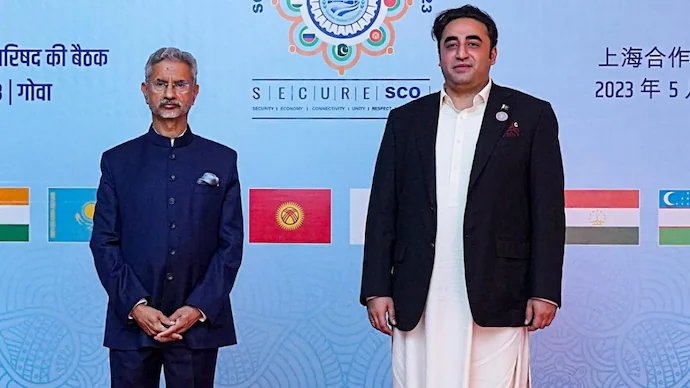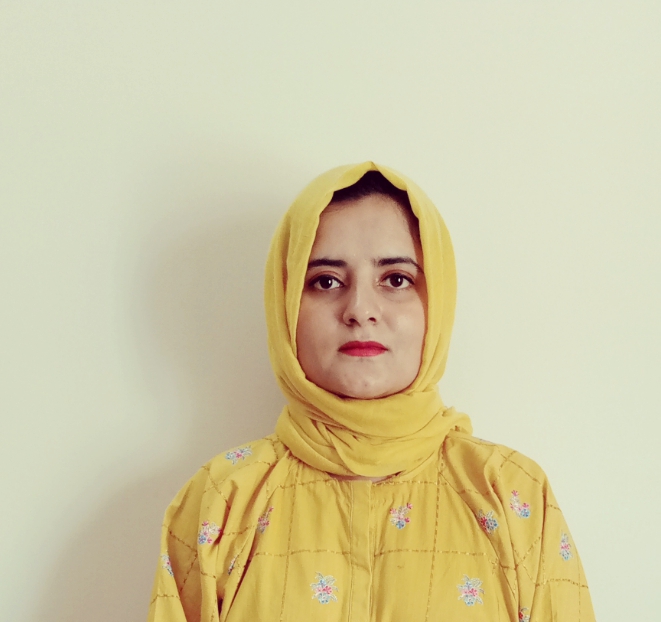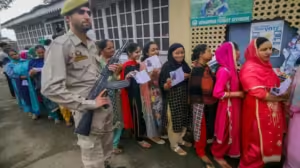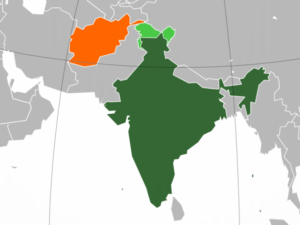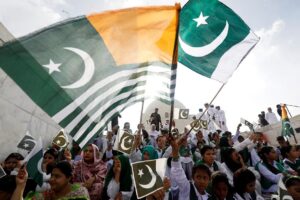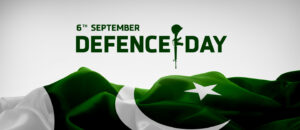By Tayyaba Khurshid
After the Ministerial meeting in Goa under SCO auspices, the Prime-Ministers of SCO Member states met virtually in SCO summit held this year. The SCO is a regional platform that was formed in 2001 with an intent to create regional cooperation with more focus on countering threats of regional terrorism, ethnic separatism and religious extremism. The SCO consists of nine Member States (China, India, Kazakhstan, Kyrgyzstan, Russia, Pakistan, Tajikistan, Uzbekistan and Iran), three Observer States (Afghanistan, Belarus, and Mongolia), who are interested in becoming Full Members, and six “Dialogue Partners” (Armenia, Azerbaijan, Cambodia, Nepal, Sri Lanka, and Turkey). In 2021, it was decided to begin the process of Iran becoming a full member of the SCO, and Iran acquired membership to SCO this year while Egypt, Qatar, and Saudi Arabia were made conversation partners.
During Indian Presidency, initially Foreign Ministers of SCO Members met on 4th and 5th May at Panaji India and after two months the Prime Ministers of SCO members states met virtually on 4th and 5th July 2023. Pakistan’s then Prime Minister Shahbaz Sharif virtually attended the summit despite speculations that Pakistan might not attend due to hostile relations of India and Pakistan and breakup in bilateral relation since the Pulwama-Balakot saga. Pakistan’s participation in both meetings hosted by India highlights its commitment to multi-lateral cooperation and SCO manifesto. There were also anticipations before both meetings, that SCO might become a platform to transform the thaw between both India and Pakistan. Yet, the two states had no bilateral interaction and showcased their points and concerns through the platform against each other. Terrorism has been a concern for both Pakistan and India and has been one of the reasons of diplomatic break-up between two states since Pulwama incident in IIOJK and resulting blame game of India on Pakistan.
Conflict Between two Arch-Rivals on Terrorism
The conflict between India and Pakistan regarding terrorism is a complex and long-standing issue rooted in historical, political, and regional factors. The primary point of contention revolves around the accusation that Pakistan supports and harbors terrorist organizations that carry out attacks in India. India has accused Pakistan of providing safe havens and support to various militant groups, particularly those operating in the Indian-administered region of Jammu and Kashmir. These groups, such as Lashkar-e-Taiba (LeT) and Jaish-e-Mohammed (JeM), have been responsible for numerous attacks in India, including the 2001 Parliament attack in New Delhi and the 2008 Mumbai attacks.
Pakistan, on the other hand, has denied these allegations and asserts that it is also a victim of terrorism. Pakistan claims that it has taken action against various militant groups and has made efforts to combat terrorism within its borders. The Ministry of Foreign Affairs in response to media queries against joint statement of Prime Minister Narender Modi and President Biden against Pakistan also highlighted the “unrendered sacrifices made by Pakistan in the fight against terrorism”. However, India argues that these actions have not been sufficient, and that Pakistan needs to do more to dismantle the terrorist infrastructure operating from its soil. The conflict over terrorism has led to heightened tensions between the two countries, resulting in multiple military standoffs and armed conflicts, particularly along the Line of Control (LoC) in Jammu and Kashmir. India has accused Pakistan of supporting cross-border terrorism, exacerbating the existing mistrust and hostility between the two nations.
International intervention and diplomatic efforts have been made to ease the tensions and address the issue of terrorism. However, finding a comprehensive solution has proven challenging due to the deep-rooted animosity and the complex nature of the conflict. It’s important to note that the conflict between India and Pakistan encompasses multiple other factors beyond terrorism, such as territorial disputes, political differences, and historical grievances. However, Terrorism remains one of the key issues contributing to the strained relationship between the two countries, but it is not the sole cause of the conflict.
Blame-Game and Diplomatic point Scoring by India
India has used all available platforms to create a false image of Pakistan internationally. Any terrorist activity that has happened in India from Twin-Peak attacks, Mumbai attacks, to Uri and Pulwama attacks has been blamed to be sponsored by Pakistan by India. Since the BJP government took over in India, the relations between two states have been on a negative trajectory, as Modi government has used anti-Pakistan rhetoric not only in its election campaigns but also throughout his tenure. The SCO Ministerial Meeting in May and Prime-Ministers Virtual Meeting was also utilized by India in diplomatic point scoring, labelling Pakistan as a terrorism sponsoring state. When the Foreign Ministers met in Goa, the Indian Foreign Minister went so far in calling Pakistani FM as spoke-person of a terror industry. In the recent address to SCO members, Prime Minister Narender Modi while highlighting India’s stance on terrorism reiterated in his virtual speech “Terrorism is a threat to regional and global peace, and it is necessary to take steps to fight this challenge, we will have to fight against terrorism of any kind. While not naming Pakistan directly but pointing fingers indirectly, he said “some countries” use cross-border terrorism as an instrument of their policy and give shelter to terrorists. SCO should not hesitate to criticize such countries openly. There should be no double standards on terrorism, and we should increase cooperation to deal with terror financing”. In response to Modi remarks, former PM Shahbaz Sharif asserted on the hydra headedness of terrorism and said, “The hydra headed monster of terrorism and extremism whether committed by individuals, societies or states must be fought with full vigor and conviction. Any temptation to use it as a cudgel for diplomatic point scoring must be avoided under all circumstances. SCO is not the first multi-lateral platform where India indirectly targeted Pakistan labelling it financing terrorism, even during the Modi State Visit to US, both President Biden and Narender Modi gave a joint statement and called on Pakistan to refrain from providing safe heavens to terrorists and ensure that its soil is not used for terrorism. The statement reflected one-sided approach of US in dealing with issues of contention between both India and Pakistan. The Foreign Ministry of Pakistan had expressed dissatisfaction and disappointment on the joint statement against Pakistan and called it “unwarranted, one sided and misleading”. Pakistan has collaborated with United States since the global war on terror and despite the close collaborations, US took diplomatic overtones and sided with Indian stance.
India has long used this tactic to remove the attention of international community from its illegal occupation of Kashmir which was further strengthened after the revocation of article 35 A and 370 by Narender Modi regime in 2019. The sufferings of Kashmiri men women and children and their slogans for freedom and self-determination echo in the valley of Indian Illegally occupied Jammu and Kashmir. Pakistan being the main party to the disputed territory has always given a voice to suppressed Kashmiri voices under Indian oppression in International Platforms and stressed the international community to stand on human rights violations in Kashmir. The political and diplomatic support of Pakistan has remained with Kashmiris, and it will continue to stand by them in their freedom struggle from illegal occupation. But that cannot in any way reflect the sponsoring of terrorism by Pakistan. Pakistan has always cooperated with Indian law enforcement agencies against any terrorist attack. It is the Indian brutality and oppression in Kashmir, that has forced the Kashmiri youth to take arms and fight for their rights. The grievances of people and the unavailability of basic human rights have compelled the youth to adopt radical means to show their protest.
One-sided approach is not the Solution
Pakistan has been a victim of terrorism and not sponsor as the Mofa statement depicts, “People of Pakistan are real heroes in this fight.” The former foreign Minister of Pakistan Bilawal Bhutto Zardari in his speech at Goa also addressed the issue of terrorism card being played by India against Pakistan. He reiterated “, Terrorism continues to threaten global security. Let’s not get caught up in weaponising terrorism for diplomatic point scoring”. Mentioning his story as victim of terrorism whose mother was assassinated at the hands of terrorist, he further added that “we must stop conflating non-state actors with state actors”. The one-sided approach adopted by India to deal with terrorism by trying to isolate Pakistan and present it as Terror sponsoring state is not the solution to deal with terrorism menace. The SCO was made on principles of mutual trust, equality and shared development and India being member of SCO must adhere to its principles. While India raises finger on Pakistan, must not ignore the grievances of people who were forced to adopt such means. The SCO platform and all other regional and international platforms must be utilized for solving the menace of terrorism and a comprehensive and collective approach needs to be adopted at such multilateral settings to resolve issues.
The United States needs to balance its relationship with both Pakistan and India and refrain from taking one-sided approach in dealing with issues like terrorism as that can pose challenge to peace and stability in South Asia. Pakistan has been removed from the FATF grey list which depicts its commitment to deal with issues related to terrorism. While highlighting Pakistan as terrorism sponsoring state and India as largest democracy where human rights and minority rights are preserved, US is providing diplomatic and moral support to India in its illegal occupation of Kashmir and discriminatory treatment against minorities. The International Organizations and Human Rights groups have revealed the worst condition of minority rights in India, but the strategic interests have forced the US to put a blind eye to Manipur riots, Khalistan Movement, Gujrat massacre and 76 years of sacrifices of Kashmiri young elderly, women and children.
In essence, halting the blame game against Pakistan is imperative, while India ought to acknowledge that its policies concerning the Kashmiri populace have played a role in fostering acts of terrorism. The pivotal resolution of the Kashmir dispute in alignment with the UN charter’s directives stands as a crucial measure not only for addressing terrorism specifically but also for fostering enduring stability across South Asia.
(The views expressed in this article belong only to the author and do not necessarily reflect the views of The Global Politico)


